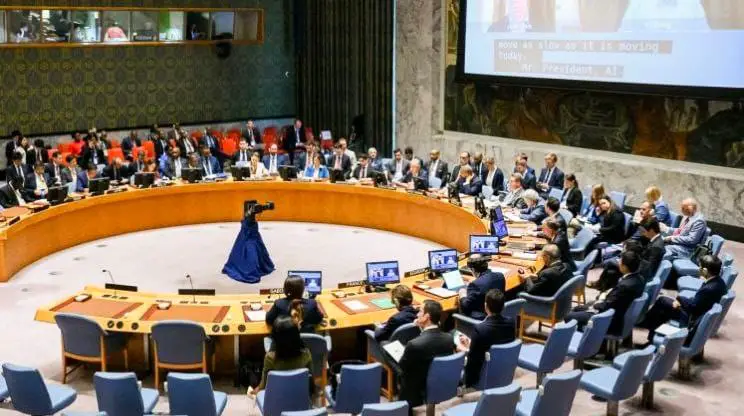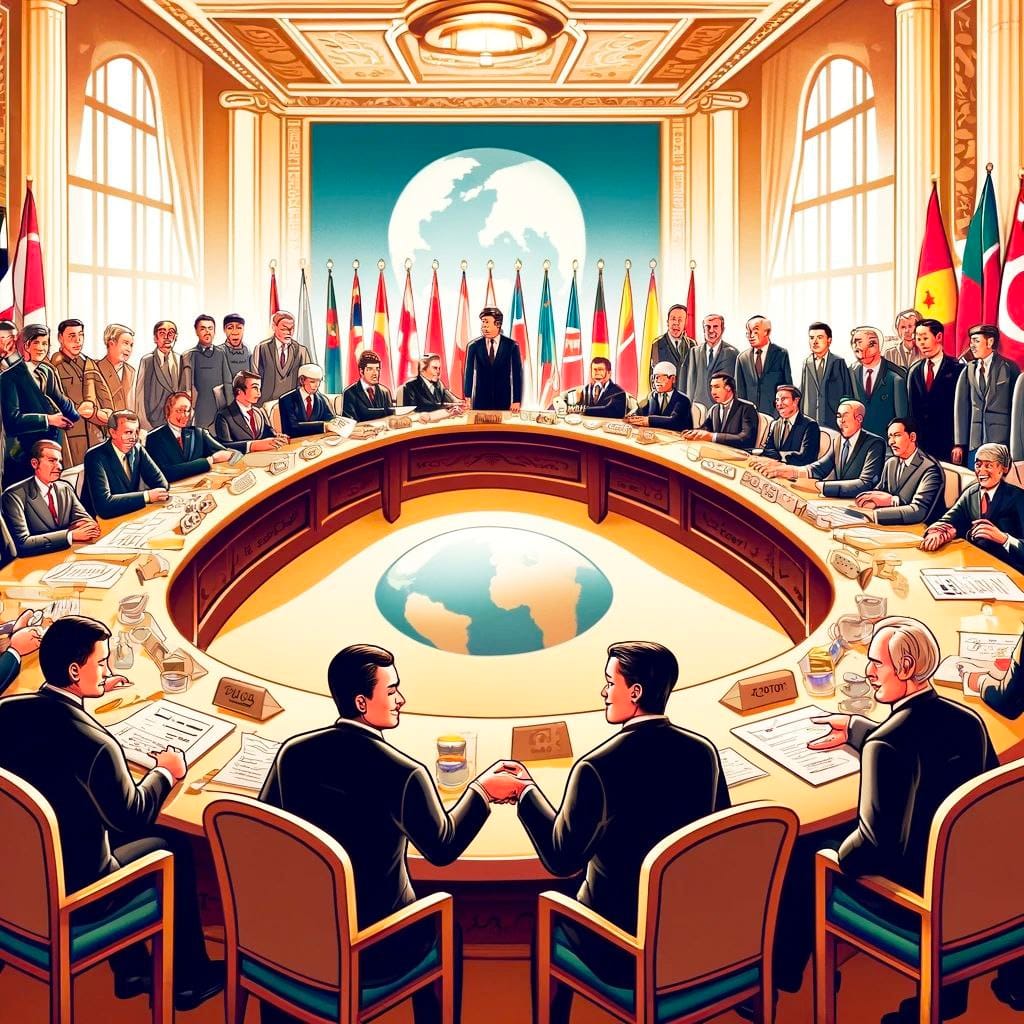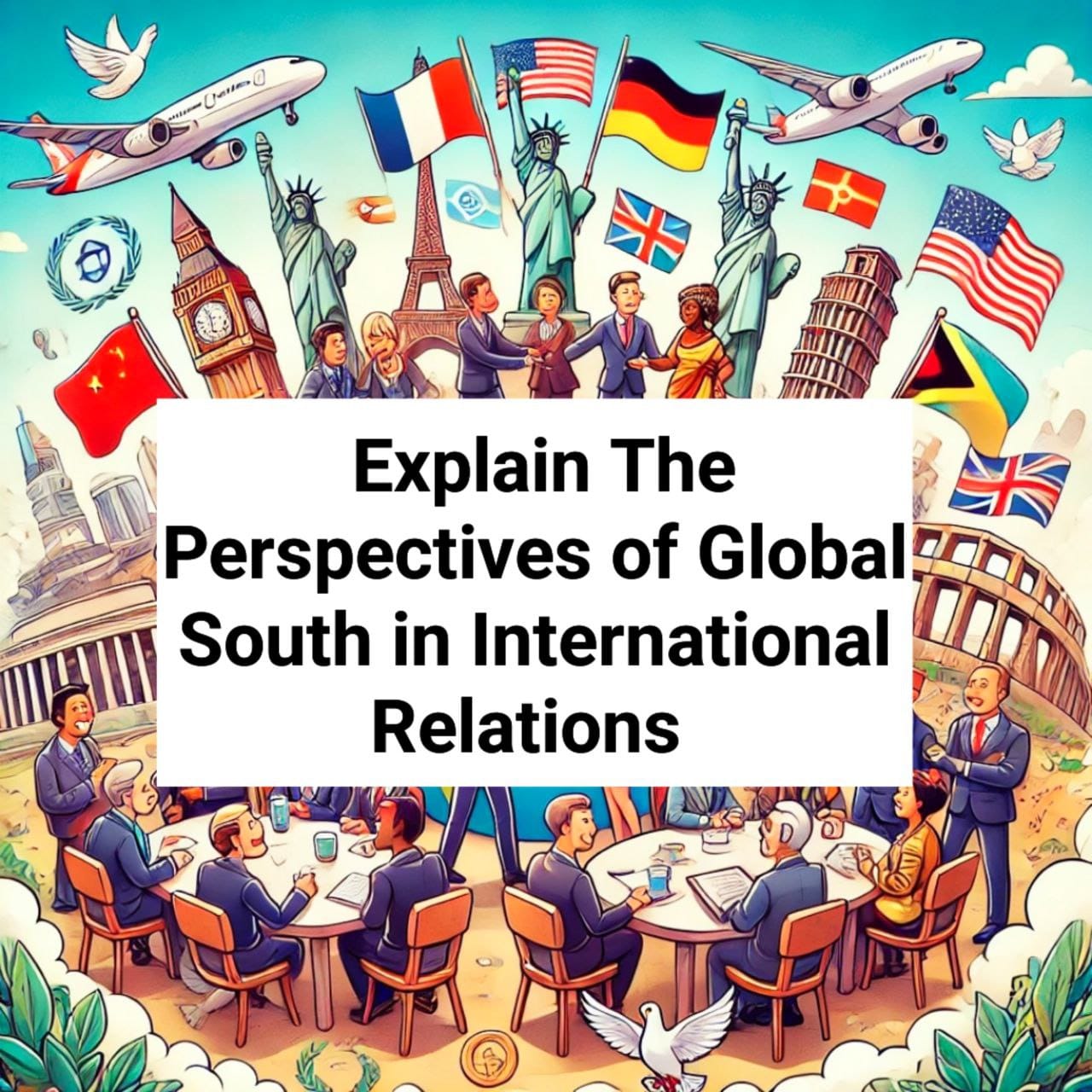Perspectives of the Global South in International Relations
The Global South refers to the regions of Latin America, Africa, Asia, and Oceania, which are generally characterized by developing or underdeveloped economies and have historically been subjected to colonialism, imperialism, and economic exploitation by the wealthier nations of the Global North (primarily Europe, North America, and parts of Asia). In international relations, the perspectives of the Global South focus on issues of economic inequality, colonial legacies, dependence on global capitalism, and the quest for a more equitable international order.
These perspectives often emerge from experiences of marginalization and a desire for greater autonomy, equality, and justice in the global system. The Global South challenges the dominance of Western-centric ideas and advocates for alternative frameworks that reflect the interests and needs of developing countries.

Key Perspectives of the Global South in International Relations
- Postcolonial Critique:
- The Global South emphasizes the colonial legacy and how the international system was shaped by European imperialism. Colonialism led to the political, economic, and cultural subjugation of many regions in the Global South, leaving behind structural inequalities that persist in modern international relations.
- Postcolonial theory in international relations critically examines how colonial powers imposed their political and economic systems on the colonies, leading to ongoing economic dependence and underdevelopment. It also highlights the continued dominance of former colonial powers and Western countries in global institutions and decision-making processes.
- Scholars from the Global South argue that even after independence, former colonies remain economically dependent on their former colonizers and global financial institutions, perpetuating neocolonial forms of exploitation.
- Economic Inequality and Dependency Theory:
- The Global South views the global economic system as fundamentally unequal and designed to benefit the wealthier nations of the Global North. This perspective is often rooted in dependency theory, which argues that developing countries are trapped in a cycle of economic dependence on developed nations, leading to underdevelopment.
- According to dependency theory, the international division of labor relegates countries in the Global South to the periphery of the global economy, where they provide raw materials and cheap labor to the core (developed countries), while core countries benefit from industrialization and technological advancement. This unequal relationship prevents sustainable economic development in the Global South.
- The World Trade Organization (WTO), International Monetary Fund (IMF), and World Bank are often criticized for imposing neoliberal economic policies (such as structural adjustment programs) that exacerbate poverty and economic instability in developing countries, while enriching multinational corporations and elites in the Global North.
- Non-Alignment and Sovereignty:
- The Global South advocates for non-alignment and the preservation of national sovereignty. Many countries in the Global South were active participants in the Non-Aligned Movement (NAM) during the Cold War, which sought to avoid alignment with either the Western bloc (led by the United States) or the Eastern bloc (led by the Soviet Union).
- The goal was to resist the pressure of superpowers and maintain independence in foreign policy decisions. This perspective continues today as many developing nations seek to avoid being drawn into geopolitical rivalries between major powers (e.g., the U.S. and China) while asserting their right to self-determination and pursuing their own development strategies.
- Sovereignty is crucial for the Global South, as many countries in these regions have experienced foreign intervention and manipulation, whether through military actions or economic pressures.
- Global Justice and Fairer International Institutions:
- Countries in the Global South advocate for global justice and reforms in international institutions to create a fairer and more inclusive global order. Institutions like the United Nations (UN), WTO, IMF, and World Bank are often seen as being dominated by wealthy countries and failing to adequately represent the interests of developing nations.
- The United Nations Security Council (UNSC), for instance, is frequently criticized for its structure, where permanent members (the U.S., U.K., France, Russia, and China) hold disproportionate power, while countries from the Global South have limited influence.
- There are calls for institutional reform, including expanding membership in the UNSC to include countries from Africa, Latin America, and Asia, as well as ensuring that global trade and financial institutions are more democratic and responsive to the needs of poorer countries.
- South-South Cooperation:
- In response to the inequalities of the global system, many countries in the Global South promote South-South cooperation as an alternative means of economic and political collaboration. South-South cooperation involves developing countries working together to foster economic growth, share knowledge, and strengthen their collective bargaining power on the international stage.
- BRICS (Brazil, Russia, India, China, and South Africa) is an example of an economic grouping that represents major emerging economies in the Global South. BRICS advocates for a multipolar world and challenges the dominance of Western-led institutions in the global economy.
- South-South initiatives also focus on technology transfer, capacity-building, and sustainable development that reflects the specific needs and contexts of developing countries, rather than replicating Western models.
- Critique of Neoliberalism:
- The Global South often critiques neoliberalism, a dominant economic ideology that promotes free markets, deregulation, and privatization. Neoliberal policies have been imposed on many developing countries through international institutions like the IMF and World Bank, often as a condition for receiving financial assistance.
- These policies are seen as benefiting multinational corporations and wealthy elites, while leading to austerity measures, reduced social spending, and increased inequality in the Global South. Many countries argue that neoliberalism exacerbates poverty and weakens state capacity to address the needs of their populations.
- Instead, the Global South advocates for economic policies that focus on inclusive growth, poverty reduction, and sustainable development tailored to local contexts.
- Environmental Justice and Climate Change:
- Many countries in the Global South emphasize the need for environmental justice in global efforts to combat climate change. The Global South is often disproportionately affected by the impacts of climate change, such as rising sea levels, desertification, and extreme weather events, even though the Global North is responsible for the majority of greenhouse gas emissions.
- Developing countries argue that wealthy nations should bear the larger share of the burden in addressing climate change, both through financial contributions and technological assistance. The Paris Agreement recognizes the principle of common but differentiated responsibilities, reflecting the Global South’s demand for fairness in global environmental policy.
- Additionally, the Global South calls for greater support in financing sustainable development, renewable energy, and adaptation efforts to mitigate the impacts of climate change on vulnerable populations.
- Cultural Identity and Decolonization:
- The Global South emphasizes the importance of cultural identity and decolonization in international relations. Decolonization is not just about political independence but also involves reclaiming cultural, intellectual, and economic autonomy from former colonial powers.
- There is a growing movement to decolonize knowledge by challenging Eurocentric narratives that dominate international relations theory, history, and development studies. Scholars and leaders from the Global South promote indigenous knowledge systems, alternative development models, and the recognition of non-Western contributions to global civilization.
- Human Rights and Social Justice:
- The Global South brings a distinctive perspective on human rights, focusing on social and economic rights as well as the traditional emphasis on civil and political rights. For many countries in the Global South, issues like access to healthcare, education, housing, and food are fundamental human rights that should be prioritized in global governance.
- This perspective often contrasts with the Global North’s focus on individual political freedoms. The Global South advocates for a more holistic understanding of human rights that reflects the material conditions and developmental needs of their societies.
- Regionalism and Collective Security:
- The Global South promotes regionalism as a means of achieving greater political and economic autonomy. Regional organizations like the African Union (AU), Association of Southeast Asian Nations (ASEAN), and Union of South American Nations (UNASUR) play important roles in coordinating collective security, development, and diplomatic efforts.
- These regional bodies aim to reduce dependency on Western powers and institutions by fostering intra-regional cooperation and promoting shared goals related to security, trade, and development.

Conclusion
The perspectives of the Global South in international relations challenge the traditional dominance of Western-centric frameworks and emphasize issues such as economic inequality, postcolonial legacies, sovereignty, global justice, and environmental responsibility. These perspectives advocate for a more equitable international order that better represents the interests and needs of developing countries. By focusing on South-South cooperation, decolonization, and the restructuring of global institutions, the Global South seeks to address historical injustices and create a more just and inclusive world system.

